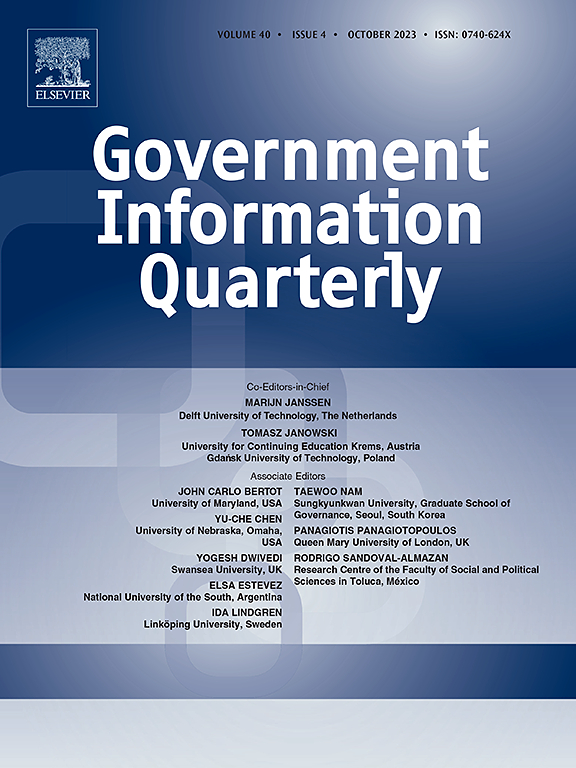Innovation interrupted: The gap between value creation and evaluation in the public sector
IF 10
1区 管理学
Q1 INFORMATION SCIENCE & LIBRARY SCIENCE
引用次数: 0
Abstract
Innovation in the public sector is crucial for addressing societal challenges, improving service delivery, and delivering public value. This qualitative study of what is valued in 141 public sector digital innovation initiatives in Sweden reveals a shift in what is valued when setting out value creation propositions (goals), and when value is later evaluated (intended outcomes). An emphasis on operational efficiency in the latter narrows the focus of innovation, prioritizing operational efficiency over broader societal benefits. Using a valuation lens, the research shows that this shift in values amounts to decoupling between value creation propositions and evaluated values. To address this, the study investigates the following research question (RQ):
How does an interruption of the coupling between value creation propositions and their evaluated value influence public sector innovation?
This study identifies three kinds of decoupling, namely translation errors, prioritization clashes, and open-endedness—that drive this interruption in public sector innovation.
While operational efficiency elsewhere is seen as a driver of (public sector) innovation, here I argue that it risks becoming an inhibitor. The same is true of open-ended digital innovation for its own sake, insofar as it contributes to decoupling perceptions of what is valuable in public sector digital innovation. By positioning these insights within the broader literature on public sector innovation and valuation, this study underscores the critical implications of avoiding decoupling, for effective innovation in the public sector.
创新中断:公共部门价值创造与评估之间的差距
公共部门的创新对于应对社会挑战、改善服务提供和创造公共价值至关重要。这项对瑞典141项公共部门数字创新计划中所重视的东西进行的定性研究揭示了在制定价值创造主张(目标)和随后评估价值(预期结果)时所重视的东西的转变。后者对运营效率的强调缩小了创新的焦点,将运营效率置于更广泛的社会效益之上。使用估值镜头,研究表明,这种价值的转变相当于价值创造主张和评估价值之间的脱钩。为了解决这个问题,本研究调查了以下研究问题(RQ):价值创造主张与其评估价值之间耦合的中断如何影响公共部门创新?本研究确定了导致公共部门创新中断的三种脱钩,即翻译错误、优先顺序冲突和开放性。虽然在其他地方,运营效率被视为(公共部门)创新的驱动因素,但在这里,我认为它有可能成为一种抑制因素。开放式数字创新本身也是如此,因为它有助于对公共部门数字创新中有价值的东西的看法脱钩。通过将这些见解置于有关公共部门创新和估值的更广泛文献中,本研究强调了避免脱钩对公共部门有效创新的重要意义。
本文章由计算机程序翻译,如有差异,请以英文原文为准。
求助全文
约1分钟内获得全文
求助全文
来源期刊

Government Information Quarterly
INFORMATION SCIENCE & LIBRARY SCIENCE-
CiteScore
15.70
自引率
16.70%
发文量
106
期刊介绍:
Government Information Quarterly (GIQ) delves into the convergence of policy, information technology, government, and the public. It explores the impact of policies on government information flows, the role of technology in innovative government services, and the dynamic between citizens and governing bodies in the digital age. GIQ serves as a premier journal, disseminating high-quality research and insights that bridge the realms of policy, information technology, government, and public engagement.
 求助内容:
求助内容: 应助结果提醒方式:
应助结果提醒方式:


